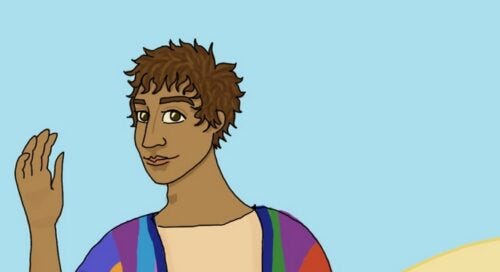I’m writing a bit of a tongue-in-cheek Lenten theme this year, on the forty-second chapters in the Bible. We’ll begin with the first one, from the first book in the Bible, Genesis. This chapter finds Joseph encountering his ten older brothers again for the first time since they sold him into slavery in Egypt.
Joseph was the favorite son, the one to whom their father gave a special, colorful coat. Joseph was the son of the woman Jacob had wanted to marry in the first place, before Jacob’s father-in-law tricked him and gave him the other daughter in marriage instead. Joseph and his younger brother, Benjamin, are the youngest of the twelve brothers and the favorites, because of who their mother is. That’s why Jacob only sends the oldest ten sons to Egypt and keeps the youngest one at home.
At this point in the story, Joseph has made his way out of slavery, and through many twists and turns, become Pharaoh’s righthand man in Egypt, “the governor,” and in charge of selling the grain that so many needed during a famine. That’s why Jacob sends his sons to Egypt – to buy grain. However, Joseph recognizes his brothers, while they do not recognize him. Moreover, in this chapter, Joseph does not tell his brothers who he is and further disguises his identity by speaking with them through a translator. Then, he accuses them of being spies and puts them in prison for three days! When Joseph releases them, he sells them the food they need, secretly returning their money back to them, but makes one of the brothers stay in Egypt as assurance that they will bring Benjamin to him. The brothers are dismayed, because they know their father will not allow Benjamin to go.
I find myself wanting to skip to the end of the story, where Joseph reveals his identity to his brothers in a few more chapters. That’s what I did in the original version of this post, before backtracking to focus on just what happens in chapter 42. The chapter ends without resolution. It ends with one of the elder ten brothers stuck in jail in Egypt. It ends with all ten older brothers being reminded that they are not their father’s favorites and still unaware that they were speaking with their brother Joseph.
Joseph’s choice to not (yet) disclose himself to his brothers sticks with me. He’d had years to think about how he would act and what he would say if he ever saw his brothers again. We’re told that Joseph remembered the dreams he’d had, including the one about his brothers bowing down before him. In chapter 42, that dream was actualized, and the brothers didn’t even know it. But Joseph knew, and not only knew, but used that knowledge and power against them. In the same verse when Joseph remembered his dreams is when he also accuses them of being spies, even though he knew they weren’t.
When you have knowledge that someone else doesn’t, it creates a tricky dynamic, especially if the knowledge is confidential. I’m thinking of the pressure I experienced during COVID to re-open the church I pastored. I refused to meet in-person inside during the height of the pandemic because I knew how many in the congregation were high-risk. Parishioners privately disclosed medical conditions to me, and I felt responsible to keep us all safe. Joseph’s information isn’t confidential, however, and withholding it as well as putting his brothers in jail seems more like payback and revenge.
I’ve been thinking a lot about how I respond to people who I recognize but who don’t recognize me. Since I moved back to an area I lived in before for a long time, it happens more often than one might think. Not everyone I knew before knows that I moved back, and these are some of the folks that I come across. Recently, I was in a job interview where the interviewer commented that we hadn’t met before. I corrected him; we had met when I interviewed with him four years prior for a chaplaincy residency. He said he was thankful I let him know, but I’m not so sure in hindsight. While it seemed to form a bond at the time, ultimately, I didn’t get the job.
Generally, I’m prepared to pretend I don’t know people who I do know. I’ve waved at too many people who I know, but who it turned out were waving at someone behind me, whether in line or at an event. And, just as often as not, rather than acknowledge me, they completely ignored me. So, on some level, I get Joseph pretending to not know his brothers, who have already hurt and rejected him in a big way.
Genesis 42 does not resolve the story. It thickens the plot. Joseph sees his brothers again, for the first time after years away in another country. He knows it, but they don’t. This chapter is the middle of the story, building up to the climax when Joseph finally self-discloses. But, not yet.
Questions to ponder: How do you act when you run into someone whom you haven’t seen in a long time? Other than privacy, what other reasons lead you to not self-disclose?




